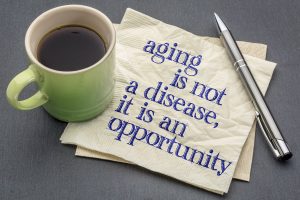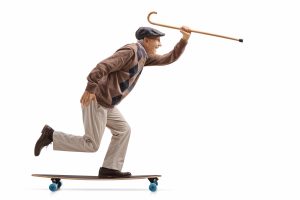 Aging isn’t easy, but we all have to do it. Contrary to the myth our culture tries to sell us, there is no escaping the march of time and the changes it brings to our bodies, minds, and lives. And these days, understanding how to age well is increasingly important since our golden years stretch out for much longer than they used to. In the last hundred years or so, the average life expectancy has increased by almost thirty years.
Aging isn’t easy, but we all have to do it. Contrary to the myth our culture tries to sell us, there is no escaping the march of time and the changes it brings to our bodies, minds, and lives. And these days, understanding how to age well is increasingly important since our golden years stretch out for much longer than they used to. In the last hundred years or so, the average life expectancy has increased by almost thirty years.
The key, as it turns out, to being happy during the latter part of life is to discover and embrace the concept of positive aging.
This can be tricky, especially in a country like the United States, where getting older is something most people either ignore or fight. But science is proving that while aging may not be a bed of roses, there are lots of things we can do to make the process more enjoyable and ensure greater happiness and better health along the way.
As if aging wasn’t already hard enough, cultural biases add to the challenges.
 It’s no wonder that we get anxious about getting older. The media and our culture tend to portray older folks as frail, forgetful, out of touch, vulnerable, and sick. Add those cultural stereotypes to our own experiences of physical and physiological changes—both expected and unexpected—and it would be weird if we didn’t start looking at birthdays with a certain amount of trepidation.
It’s no wonder that we get anxious about getting older. The media and our culture tend to portray older folks as frail, forgetful, out of touch, vulnerable, and sick. Add those cultural stereotypes to our own experiences of physical and physiological changes—both expected and unexpected—and it would be weird if we didn’t start looking at birthdays with a certain amount of trepidation.
In Western cultures in particular, the older members of society tend to be shunted aside to make room for the young and virile. In the United States, we have billion-dollar fitness and beauty industries wholly dedicated to the ultimately pointless task of attempting to swindle Mother Nature. Perhaps even more damaging to the wellbeing of seniors, however, are the many ways in which our cultural norms render older people invisible, leaving them lonely and without any meaningful purpose.
Other cultures do a much better job of respecting and venerating their elders. In Japan, for instance, their philosophical traditions perceive aging as a sign of maturity and wisdom. In the Japanese culture, old age is considered as valuable a stage of life as any other. Many indigenous cultures share this perception of elders as pillars of the community and people with much to teach.
But, here in the United States, we still have a lot of work to do to elevate seniors in our society. Positive aging is one way that individuals can make a difference in their own experience.
Science to the rescue – there’s evidence we can make a difference in how we age.
The good news is that there’s a fair amount of science to back up the belief that we can make a difference in how we feel—mentally, physically, and emotionally—as we get older.
Becca Levy, a researcher at Yale, found that people who ascribed to more positive stereotypes about aging lived a full seven-and-a-half years longer than people who believed negative stereotypes.
And the work of Ursula Staudinger, director of the Robert N. Butler Columbia Aging Center at the Mailman School of Public Health, has made great strides in debunking the myth that you can’t teach an old dog new tricks. Her research looks at how the interactions of biology, behavior, and culture shape personal development throughout our lives. And she has found that there is what scientists call “plasticity of the personality” well into adulthood.
Translation: it is possible for older people to develop and maintain a sense of openness even into their senior years; and this openness can contribute positively to the ability to adapt to and enjoy life more fully.
Some of the most fascinating research in this arena is that of Elizabeth Blackburn, who won the 2009 Nobel Prize in Physiology or Medicine for her work about telomeres. A telomere is the end of a chromosome, and it helps to protect the chromosome from damage. The natural wearing down of telomeres is what causes typical signs of aging like gray hair, wrinkles, and a weakened immune system.
Blackburn discovered telomerase, an enzyme that can fix damaged telomeres. Her research showed that stress—regardless of age—is a major factor in the breakdown of telomeres. Further, she found that simple practices—like meditation or a change in attitude—and external factors—like a happy marriage and strong friendships—can improve the strength of telomeres.
That’s a lot of hard science pointing the way to a happier, more fulfilled life in our later years.
Getting started on your positive aging journey is easier than you might think.
So, what’s the average person-of-a-certain-age supposed to do with all this information about cultural norms, extended life expectancies, and telomeres? Luckily, the recommendations from doctors and scientists alike boil down to some pretty simple and common sense measures that can make a big difference over the long term.
-
- One of the most important things all experts agree on is the importance of mitigating stress, reducing anxiety and depression, and generally giving yourself the tools necessary to lessen fears. The methods by which you can tackle this challenge span mental, emotional, and physical best practices.
-
- On the mental and emotional side of things, many researchers have seen very positive outcomes in people who use meditation, prayer, and other forms of mindfulness practice to ground themselves, relax, and live in the moment.
-
- In addition to these tactics, you may benefit from practicing acceptance and gratitude. If you’re able to think about aging less as a negative thing that’s happening to you and more as a journey of transition, you will put yourself in a much better position to remain positive and open to what may come.
-
- Creating strong social supports and generally being engaged with life are ways to set yourself up for positive aging. As Blackburn found, happy marriages and strong friendships made a difference in the health of vital telomeres.
-
 It’s also important to be open to new experiences and find ways to give yourself daily and long-term purpose. As we get older, pieces of our identity fall away. Our kids are grown. We may be retired from a long career. And we may not be able to participate in the activities that once helped define who we are. A positive approach to aging includes searching out new adventures, learning new skills, and finding new roles to take on in our communities.
It’s also important to be open to new experiences and find ways to give yourself daily and long-term purpose. As we get older, pieces of our identity fall away. Our kids are grown. We may be retired from a long career. And we may not be able to participate in the activities that once helped define who we are. A positive approach to aging includes searching out new adventures, learning new skills, and finding new roles to take on in our communities.
-
- And, finally, all the tried-and-true health advice we’ve been hearing forever also applies when it comes to pursuing a more positive approach to aging. Eat healthy foods, strengthen your immune system, exercise regularly, and get enough sleep.
The good news is that balance and moderation apply in all these areas. For instance, you don’t need to run a marathon or even do intense exercise multiple times a week. Sometimes, it’s enough to go for a walk, do a little gardening, and maybe play catch with the dog.
Aging isn’t easy, but it isn’t the end of the world either. As W. Somerset Maugham said, “Old age has its pleasures, which though different, are not less than the pleasures of youth.”
So, here’s to the pleasures of the golden years and enjoying them to the fullest.
Related Posts:
Write a Letter: 3 Reasons It’s More Important Than Ever
Discover Your Inner Artist! How and Why to Start Now
How to Keep Your Brain Strong: 3 Great Ways to Build Your Mental Muscles
 Connecticut Estate Planning Attorneys Blog
Connecticut Estate Planning Attorneys Blog


